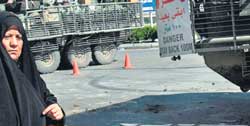
| The unwinnable war in Iraq: A political liability for Republicans NEW YORK - When American military forces were taking heavy casualties during the height of the Vietnam war in the late 1960s and early 1970s, the US tried a new political strategy of "winning the hearts and minds" of the Vietnamese. But not everyone at the White House was enthused with this strategy. At least one hardline senior official was quoted as saying: "If you catch them by the balls, their hearts and minds will follow." Obviously, neither strategy worked because the US was forced to beat a hasty retreat after an ignominious defeat in Vietnam. The casualties during that war (1964-1975) included over 58,226 US deaths or soldiers missing in action (MIAs). According to the Vietnamese, over 1.5 million of their countrymen were killed, of which at least four million were civilians. Perhaps some of the figures are still in dispute.
Just before the US-led coalition invaded Iraq three years ago, Iraq's former Deputy Prime Minister Tariq Aziz held out an ominous threat. Addressing the Institute of Strategic Studies in London, he warned that Iraq will turn out to be America's second Vietnam. "Let our cities be our swamps and our buildings our jungles," he said. The words now seem to be prophetic, although the scale of the war in Iraq is not yet that of Vietnam. Still, like the military "quagmire" in Vietnam, the US seems to be bogged down in an Iraqi swamp. After denying any comparisons between the two conflicts, President George W. Bush says the New York Times "could be right" in describing the rising insurgency in Iraq as "the jihadist equivalent of the Tet offensive" in Vietnam. This was the first time that Bush admitted a parallel between the two conflicts. According to Vietnam era historians, the Tet offensive was a turning point in that long drawn-out war which was later acknowledged as being "unwinnable". One of the biggest political casualties was President Lyndon Johnson who was forced to give up his plans to run for re-election, as his popularity continued to decline in public opinion polls. Even though President Bush is prevented from running a third term due to constitutional limitations, his popularity has suffered a Johnsonian fate against the backdrop of the rising insurgency in Iraq. The "unwinnable" war in Iraq, on the other hand, is expected to trigger a defeat for the ruling Republican Party in the upcoming Congressional elections in early November. Although the American economy is unusually strong, the Iraq war has taken a higher political priority on the election agenda. An increasingly large number of Republican candidates have distanced themselves from Bush, and also kept him off their election platforms, since his pro-war policy has turned out to be a liability. As the death toll keeps mounting, the number of US soldiers killed has reached more than 2,800 over the last three years. The killings of 96 soldiers in October alone -- with two more days to go -- are heading for an all-time record. Meanwhile, a study by researchers at the John Hopkins Bloomberg School of Public Health, released last week, says that an estimated 600,000 civilians have died in violence across Iraq, since the invasion in 2003. These killings mostly include deaths caused by the increasing sectarian violence between Shiites and Sunnis. Back in the US, the political backlash over the war also keeps spreading. Still, at a press conference last week, Bush's credibility was challenged once again. Asked whether the US was winning the war in Iraq, he said "Absolutely, we're winning." Perhaps that was an answer that should have rightly been drowned in howls of laughter. But Bush did admit several mis-steps in the US strategy in Iraq. "I know many Americans are not satisfied with the situation in Iraq. I'm not satisfied, either." And he added: "That's why we're taking new steps to help secure Baghdad, and constantly adjusting our tactics across the country to meet the challenging threat." Meanwhile, like every war, the conflict in Iraq, has been good for the country's military-industrial complex. Just before the war, Deputy Defence Secretary Paul Wolfowitz (now President of the World Bank) confidently predicted that the overall cost could be under $50 billion and that the bulk of the funding for post-war reconstruction could come from Iraq's oil revenues. But the realities on the ground have been far different. Last week, the New York Times quoted Joseph Stiglitz, the Nobel Laureate economist from Columbia University, who said the total costs of the Iraq war could exceed a staggering $2 trillion. Putting it in domestic perspective, the Times said the $2 trillion was the equivalent of four times the additional cost needed to provide health insurance for all uninsured Americans for the next decade. Perhaps the most forceful comment last week came
from Kevin Tillman, a former army ranger who had served both in
Iraq and Afghanistan, and whose older brother Pat was a victim of
friendly fire in Afghanistan after being accidentally shot by his
own army buddies. "Somehow," said an angry Kevin Tillman,
"the same incompetent, narcissistic, virtueless, vacuous, malicious
criminals are still in charge of this country. Somehow, this is
tolerated. Somehow, nobody is accountable for this." |
| || Front
Page | News
| Editorial
| Columns
| Sports
| Plus
| Financial
Times | International
| Mirror
| TV
Times | Funday
Times || |
| |
Copyright
2006 Wijeya
Newspapers Ltd.Colombo. Sri Lanka. |
